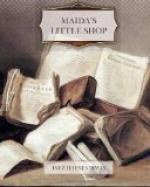Granny dressed her according to Maida’s choice, in white. A very, simple, soft little frock, it was, with many tiny tucks made by hand and many insertions of a beautiful, fine lace. Maida chose to wear with it pale blue silk stockings and slippers, a sash of blue, striped in pink and white, a string of pink Venetian beads.
“Now, Granny, I’ll read until the children call for me,” she suggested, “so I won’t rumple my dress.”
But she was too excited to read. She sat for a long time at the window, just looking out. Presently the jack-o’-lanterns, lighted now, began to make blobs of gold in the furry darkness of the street. She could not at first make out who held them. It was strange to watch the fiery, grinning heads, flying, bodiless, from place to place. But she identified the lanterns in the court by the houses from which they emerged. The three small ones on the end at the left meant Dicky and Molly and Tim. Two big ones, mounted on sticks, came from across the way—Rosie and Arthur, of course. Two, just alike, trotting side by side betrayed the Clark twins. A baby-lantern, swinging close to the ground—that could be nobody but Betsy.
The crowd in the Court began to march towards the shop. For an instant, Maida watched the spots of brilliant color dancing in her direction. Then she slipped into her coat, and seized her own lantern. When she came outside, the sidewalk seemed crowded with grotesque faces, all laughing at her.
“Just think,” she said, “I have never been to a Halloween party in my life.”
“You are the queerest thing, Maida,” Rosie said in perplexity. “You’ve been to Europe. You can talk French and Italian. And yet, you’ve never been to a Halloween party. Did you ever hang May-baskets?”
Maida shook her head.
“You wait until next May,” Rosie prophesied gleefully.
The crowd crossed over into the Court Two motionless, yellow faces, grinning at them from the Lathrop steps, showed that Laura and Harold had come out to meet them. On the lawn they broke into an impromptu game of tag which the jack-o’-lanterns seemed to enjoy as much as the children: certainly, they whizzed from place to place as quickly and, certainly, they smiled as hard.
The game ended, they left their lanterns on the piazza and trooped into the house.
“We’ve got to play the first games in the kitchen,” Laura announced after the coats and hats had come off and Mrs. Lathrop had greeted them all.
Maida wondered what sort of party it was that was held in the kitchen but she asked no questions. Almost bursting with curiosity, she joined the long line marching to the back of the house.
In the middle of the kitchen floor stood a tub of water with apples floating in it.
“Bobbing for apples!” the children exclaimed. “Oh, that’s the greatest fun of all. Did you ever bob for apples, Maida?”
“No.”




